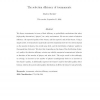Free Online Productivity Tools
i2Speak
i2Symbol
i2OCR
iTex2Img
iWeb2Print
iWeb2Shot
i2Type
iPdf2Split
iPdf2Merge
i2Bopomofo
i2Arabic
i2Style
i2Image
i2PDF
iLatex2Rtf
Sci2ools
EOR
2010
2010
The selection efficiency of tournaments
We discuss tournaments in terms of their efficiency as probabilistic mechanisms that select high-quality alternatives ("players") in a noisy environment. We use two criteria of selection efficiency: the expected quality of the winner, and the expected rank of the winner. Using a simple model, we demonstrate analytically and with simulations how the two criteria depend on the number of players, the overall noise level, and the distribution of players' quality in the population of interest. We show that, depending on the shape of the distribution of players' quality, the selection efficiency criteria may exhibit unexpected nonmonotonic behavior as functions of the number of players and noise level. The major result is that although, on average, an increase in the number of players unambiguously leads to an increase in the winner's quality, it additionally improves the winner's rank for fat-tailed quality distributions, whereas for narrow-tailed quality dist...
Related Content
| Added | 10 Dec 2010 |
| Updated | 10 Dec 2010 |
| Type | Journal |
| Year | 2010 |
| Where | EOR |
| Authors | Dmitry Ryvkin |
Comments (0)

